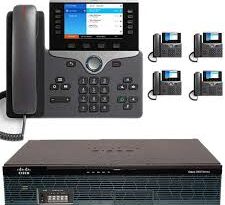Office Telephone System in Kenya
Understanding Office Telephone Systems in Kenya’s Business Landscape
Kenyan businesses nowadays face specialized communication challenges for which they require efficient, scalable solutions. A Kenyan office phone system has traveled a far way since simple landline installations to today’s sophisticated unified communication systems that integrate voice, data, and digital messaging. In expanding operations in Nairobi, Mombasa, and other cities, selecting the right telecommunication configuration becomes a critical factor in sustaining competitiveness.
Communication failures lose businesses millions of dollars each year in lost opportunities, responses delayed, and customer dissatisfaction. For Kenyan companies in industries such as banking, tourism, manufacturing, and commerce, installing a professional office telephone system in Kenya directly affects top-line growth and business performance.
Types of Office Telephone Systems Available in Kenya
Traditional PBX Systems
Private Branch Exchange (PBX) systems are the classic means of office communications. These are hardware-based systems, and they maintain dedicated installed hardware on your premises that interconnects several extensions through a central switch. While PBX technology has been in use by Kenyan businesses for decades, the initial cost of setup and ongoing maintenance requirements render them less suited for growing businesses.
IP-Based Telephone Solutions
Internet Protocol (IP) telephony systems transmit voice communications over data networks rather than with traditional telephone lines. The technology allows businesses to leverage existing networking gear for voice communications, reducing costs significantly. An IP-based office phone system in Kenya offers flexibility that traditional systems cannot offer, including remote work and easy scaling.
Cloud-Hosted Communication Platforms
Cloud telephony avoids the use of on-site hardware altogether. Remote maintenance is done by service providers on hosted equipment and software, and communication services are offered through internet connections. Enterprise-grade features with little capital expenditure are offered by cloud systems to Kenyan businesses concerned with capital expenditure and technical assistance.
Hybrid Communication Systems
Hybrid systems combine traditional telephony with new IP capabilities, allowing companies to transition from legacy infrastructure on a step-by-step basis. It is especially suitable for established Kenyan companies with existing telephone investments that wish to upgrade without having to replace the system altogether.
Key Features That Define Quality Office Telephone Systems
Auto-Attendant and Call Routing
Professional auto-attendants greet and route callers to the appropriate departments without the touch of a human hand. Automation reduces the workload for the receptionist while enabling customers to reach the correct individual in a timely fashion. For a multi-department Kenya office phone system, intelligent call routing is its weight in gold during peak business hours.
Conference Calling Capabilities
Contemporary business collaboration demands efficient conference calling. Quality systems accommodate multiple participants at once with good-quality audio, which is crucial for organizations that have branch offices in Nairobi, Kisumu, Nakuru, or foreign locations.
Call Recording and Monitoring
Recording capabilities serve several purposes, including quality control, training, compliance archives, and conflict resolution. Managers can monitor live calls or review recordings to improve customer service levels and protect against liability issues.
Mobile Integration
As remote work becomes commonplace in Kenya, mobile integration allows employees to use their smartphones as extensions of the office system. Staff can make and receive calls using business numbers regardless of physical location, maintaining professional image while working flexibly.
Voicemail to Email Transcription
This feature converts voicemail messages into text and emails them to recipients, enabling faster response times and easier message management. Sales teams particularly benefit from quickly scanning message content without listening to audio files.
Technical Requirements for Implementation
Network Infrastructure Considerations
IP-based office telephone systems demand robust network infrastructure. Your existing structured cabling and networking systems must provide adequate bandwidth and quality of service (QoS) settings to prioritize voice traffic. Poor network configuration results in call quality issues like jitter, latency, and dropped connections.
Recommended specifications include:
- Minimum 100 Kbps per concurrent call
- Network switches with QoS capabilities
- Uninterrupted power supply (UPS) for network equipment
- Proper cable management following industry standards
Power and Backup Solutions
Reliable communication requires uninterrupted power. Kenyan businesses experiencing frequent power fluctuations should invest in quality UPS systems and possibly generator backup for critical communication infrastructure. When selecting an office telephone system in Kenya, calculate power consumption requirements and plan backup accordingly.
Internet Connectivity Requirements
For cloud or IP-based systems, internet reliability directly impacts phone service quality. Consider implementing redundant internet connections from different providers to ensure business continuity. Fiber connections offer superior performance compared to wireless alternatives for offices with high call volumes.
Integration with Business Security Systems
Communication systems increasingly integrate with broader business infrastructure. Companies investing in security systems and CCTV installation can benefit from unified platforms where intercoms, access control, and telephone systems work together. For example, visitors calling from entrance intercoms can be granted access remotely while maintaining communication throughout the verification process.
Biometric access control systems can trigger call forwarding rules based on employee presence, and fire alarm systems can automatically initiate emergency notifications through the telephone network. This integration creates comprehensive business solutions rather than isolated technology islands.
Cost Considerations for Kenyan Businesses
Initial Investment Analysis
Traditional PBX systems require substantial upfront investment in hardware, installation, and configuration. Costs vary based on capacity requirements but typically range from several hundred thousand to millions of shillings for enterprise installations. Cloud-based solutions eliminate much of this initial expense, instead charging monthly per-user fees.
Ongoing Operational Expenses
Monthly costs include line rental, call charges, maintenance contracts, and software licensing. When budgeting for an office telephone system in Kenya, factor in potential call volume growth and staff expansion. Cloud solutions offer predictable monthly expenses, while traditional systems may incur unexpected maintenance costs for aging equipment.
Return on Investment Factors
Calculate ROI by considering productivity gains, reduced missed calls, improved customer satisfaction, and potential staff reductions in reception roles. Many Kenyan businesses recover their communication system investment within 18-24 months through operational efficiencies alone.
Selecting the Right Provider in Kenya
Evaluation Criteria
When choosing a telephone system provider, prioritize companies with proven track records in Kenyan markets. Essential evaluation factors include:
- Local technical support availability
- Installation expertise and certifications
- After-sales service commitments
- Scalability options for business growth
- References from similar-sized organizations
- Hardware warranty and replacement policies
Professional Installation Importance
Proper installation determines long-term system performance. Engage providers offering professional installation services with certified technicians who understand Kenyan infrastructure challenges. Quality installers conduct site surveys, plan cable runs properly, configure systems correctly, and provide comprehensive staff training.
Support and Maintenance Requirements
Reliable technical support proves critical when communication systems fail. Verify provider response times, support hours, and escalation procedures. Companies operating outside Nairobi should confirm support availability in their regions, whether in Mombasa, Eldoret, or smaller towns.
Future-Proofing Your Communication Investment
Technology evolves rapidly, and systems purchased today must accommodate tomorrow’s requirements. When implementing an office telephone system in Kenya, consider platforms supporting:
- Artificial intelligence features like voice recognition and automated responses
- Integration with customer relationship management (CRM) software
- Video calling and collaboration tools
- Team messaging and file sharing
- Analytics and reporting capabilities
Choosing vendors committed to regular software updates and feature enhancements protects your investment against obsolescence.
Implementation Best Practices
Planning Phase
Successful implementations begin with thorough planning. Document current communication patterns, identify pain points, and define success criteria. Involve stakeholders from different departments to ensure the selected system meets diverse organizational needs.
Staff Training Programs
Even sophisticated systems fail without proper user adoption. Allocate sufficient time for comprehensive staff training covering basic operations, advanced features, and troubleshooting procedures. Consider creating reference materials and video tutorials for ongoing learning.
Gradual Rollout Strategy
Rather than switching entirely on a single date, implement in phases. Start with a pilot department, address issues, refine processes, then expand to other areas. This approach minimizes disruption and allows teams to adapt gradually.
Conclusion
Selecting an appropriate office phone system in Kenya is a careful consideration of the immediate needs, budget factors, and long-term growth strategies. In traditional PBX, IP-based, or cloud platforms, let reliability, expandability, and support by the provider be your main concerns. Interoperability with existing networks and security devices makes integral business solutions, enhancing overall operational efficiency.
Kenyan companies that invest in quality communication systems set themselves up for expansion, enhanced customer satisfaction, and competitive success in increasingly interlinked markets. Work with skilled providers who have professional installation, authentic products, and committed support to guarantee that your communication infrastructure is a business asset rather than a technical burden.



 No products in the cart.
No products in the cart.